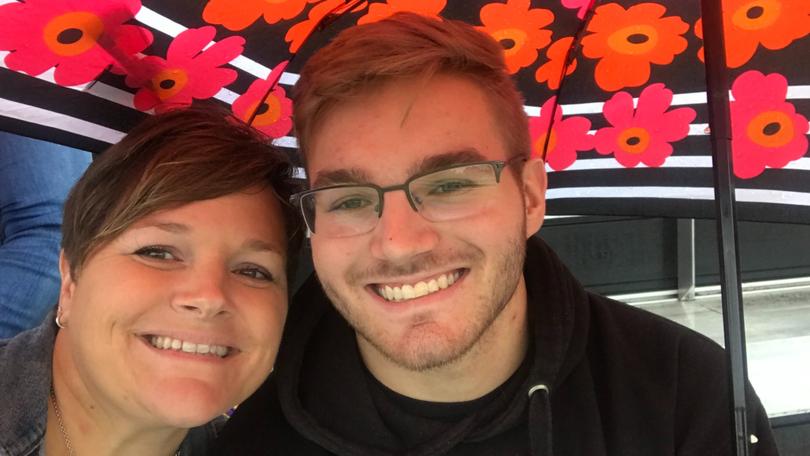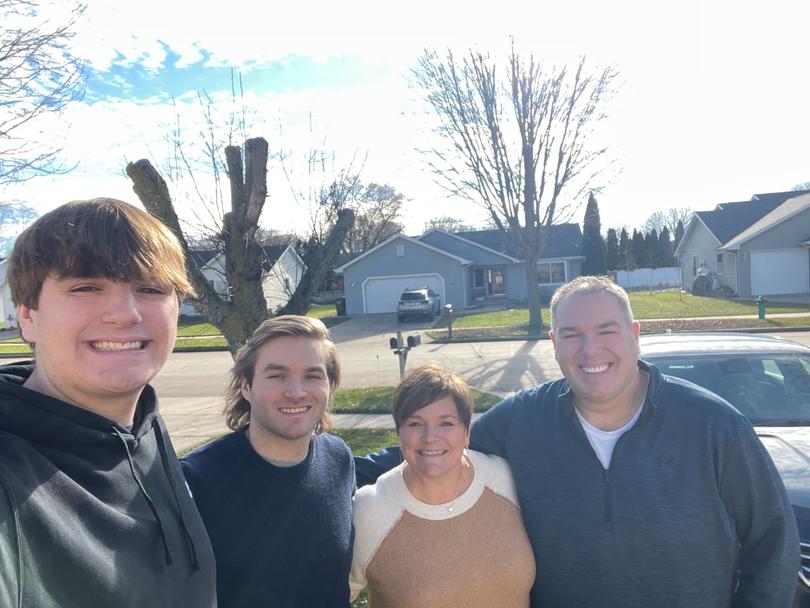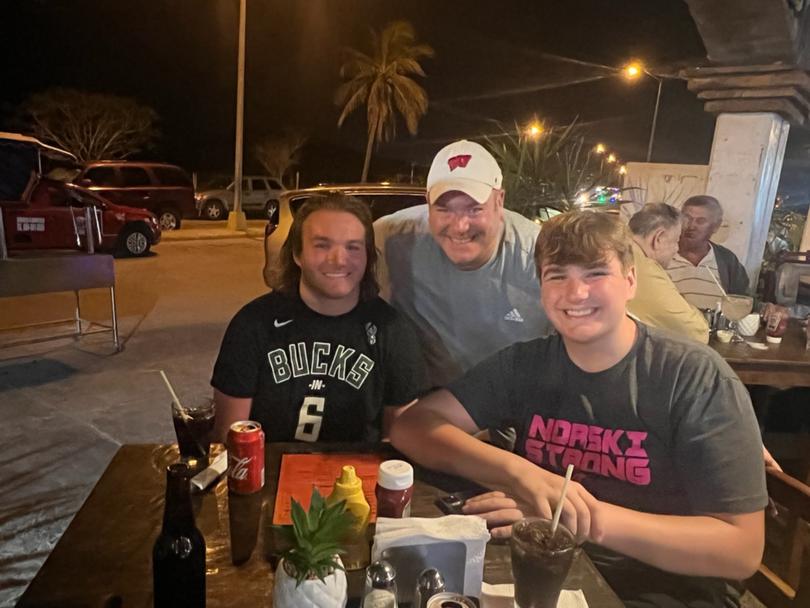Cole Schmidtknecht dies of asthma attack after inhaler cost skyrockets to more than $500 in US

Cole Schmidtknecht expected to pay $66.86 for a three-month supply of his preventative asthma inhalers in January 2024 when he went to his Walgreens pharmacy in Appleton, Wisconsin. The pharmacy allegedly told him his insurance no longer covered the medication, so he would have to pay the full cost.
The bill: $539.19, according to a recently filed lawsuit.
Schmidtknecht, 22, couldn’t afford that, and so for the next five days, he struggled to breathe with only an emergency asthma inhaler, the suit states.
Sign up to The Nightly's newsletters.
Get the first look at the digital newspaper, curated daily stories and breaking headlines delivered to your inbox.
By continuing you agree to our Terms and Privacy Policy.Then, on Jan. 15, he had a severe asthma attack. Within minutes, he was brain-dead. Six days later, his parents took him off life support.
Now, Bil and Shanon Schmidtknecht, both 47, have filed a wrongful death and negligence lawsuit against the pharmacy and pharmacy benefit manager that had been supplying their son with his asthma medication.
In a 26-page complaint filed on Jan. 21 in the U.S. District Court for Eastern Wisconsin, the Schmidtknechts accuse Optum Rx - a subsidiary of United Health Group and one of the country’s three largest pharmacy benefit managers - of illegally denying Cole his “lifesaving” inhaler, forcing him to unexpectedly bear the full cost of the medication, said the Schmidtknechts’ lawyer, Michael Trunk. They allege that the Walgreens pharmacy in Appleton failed to inform him or his doctor of alternative medications.
“We want to get justice for our son,” Bil told The Washington Post, “and want to make sure it does not happen to someone else.”
Optum Rx declined to comment on the lawsuit, but in April, the company told the Madison, Wisconsin-based TV station WMSN that it instructed the Walgreens pharmacy in Appleton to tell Cole to contact the doctor who prescribed Advair Diskus about getting three “clinically-appropriate” alternatives that were covered.
The pharmacy never did, the Schmidtknechts allege.
Walgreens spokesman Marty Maloney said the company was declining to comment on the Schmidtknechts’ lawsuit.
Failure to advise
Barry Furrow, law professor and director of Drexel University’s health law program, said the strongest part of the Schmidtknechts’ lawsuit is the allegation that the pharmacy failed to tell their son about alternatives to Advair. Furrow cited the Omnibus Budget Reconciliation Act of 1990, a law that expanded pharmacists’ power and increased their responsibility to act on medical errors and conflicting prescriptions that came in.
“It seems to me there was a failure here to advise,” Furrow said. But, he added, Walgreens will almost certainly blame Cole for not being more proactive about asking the pharmacy about alternatives to Advair.
Furrow called the Schmidtknechts’ claim against Optum Rx “a bit of stretch” if Optum, as it claims, directed the pharmacy to tell Cole to contact his doctor about alternative medications. But, he added, the Schmidtknechts will be highly sympathetic plaintiffs if their case against Optum makes it in front of jurors, who, given a spate of bad news coverage against PBMs, could be inclined to punish “the biggest bad actor here.”
Jurors “are just going to kill them,” said Furrow, who works at Drexel’s law school, which is named after Thomas Kline, a founding partner of Kline and Specter, the law firm representing the Schmidtknechts.
‘Pretty life-changing’
Cole Schmidtknecht had struggled with chronic asthma since he was a toddler, his parents said. As soon as he could run, he was dogged by high-pitched wheezing. That came as no surprise to his parents, who are lifelong asthmatics and suspected they might pass on the malady to their child.
In early childhood, Schmidtknecht’s asthma meant being tethered to an albuterol emergency inhaler and unexpected trips to the emergency room, according to the Schmidtknechts. Meanwhile, he developed a love of sports, especially flag football and then Pop Warner, which meant coping with his illness.
When he was about 13, he started taking Advair Diskus, a preventative corticosteroid inhaler, they said. Each morning, he would take a hit and rarely need to worry about having trouble breathing, whether he was walking around, playing with his younger brother or bull-rushing a quarterback on the football field.
“It was pretty life-changing,” Shanon Schmidtknecht said, adding: “He was just a normal, active kid.”
Advair became an unthinking part of Cole Schmidtknecht’s daily routine for the next decade, his parents said. Once he started working in parts sales for a trucking company in March 2023 and got medical coverage as a result, he went to the pharmacy every three months to pay $67 for three 30-day Advair inhalers, Trunk wrote in the lawsuit.
He expected to do the same on Jan. 10, 2024, but didn’t know that Optum Rx had stopped covering Advair in the new year, according to the suit. The Walgreens pharmacy allegedly told him he would have to pay full price, which was more than eight times his normal co-pay.
Schmidtknecht, who made what his parents described as a “modest hourly wage,” left without it and, unbeknownst to his parents, struggled to breathe over the next five days while relying on his emergency albuterol inhaler, the suit states.

On Jan. 15, Schmidtknecht had a severe asthma attack and started to asphyxiate, according to the suit. His roommate started driving him to ThedaCare Regional Medical Center-Appleton hospital, about a six-minute ride from their duplex, his parents said. During the trip, Schmidtknecht passed out about two minutes before they got there, and by the time they’d arrived, Cole was blue and didn’t have a pulse, the suit states.
The medical staff gave him two doses of epinephrine and performed two rounds of cardiopulmonary resuscitation lasting four minutes, according to the suit. An emergency room doctor called the Schmidtknechts, who made the roughly 100-mile trip to the hospital, they said in an interview. The doctor told them they had their son on life support and were monitoring his brain activity, they said. The next two to three days would be critical as they took Cole off sedatives and got a better sense of how long his brain had been deprived of oxygen, he told them.
When doctors did, there was little to no brain activity, the Schmidtknechts said. Flanked by nurses, a neurologist broke the bad news to his parents: Their son was in a vegetative state and would never wake up, the Schmidtknechts said. Anticipating his parents’ reaction, nurses shoved chairs under them to stop them from crashing to the floor. Shanon fell into one, while Bil collapsed onto Cole’s chest.
As the doctor and nurses left the room, they both cried in silence at his bedside.
In the coming days, they got to say goodbye. So did others. Family friends and co-workers cycled into his hospital room in 20-minute blocks to talk to him one last time and offer his parents condolences. Meanwhile, doctors from around the country scrambled to Appleton to quickly harvest some of his body - bone, tissue and his eyes - so he could help others.
On Jan. 21, as doctors took Cole off life support, Shanon ducked out of his hospital room, unable to bear the sound of her son’s death rattle, she said. Bil remained, and in Cole’s final moments, he put his head on his first born’s chest.
He heard his heart stop.
‘So preventable’
In the weeks and months after Schmidtknecht’s death, his parents learned he had tried and failed to get his Advair prescription because of the $540 price tag but didn’t know why the cost had skyrocketed. They wondered if he had forgotten his insurance card.
About two weeks after Schmidtknecht’s asthma attack, Shanon said, she tried to fill her husband’s Advair prescription at their local independent pharmacy only to learn the reason for the price increase: Optum Rx no longer covered it, she said. The difference: Their pharmacist took the time to tell Shanon about possible workarounds, they said. Bil got an alternative inhaler.

Like his son, Bil had received no notice from Optum about the company no longer covering Advair in the new year, he said. Wisconsin law requires pharmacy benefit managers to notify patients when they stop covering or raise the prices on prescriptions to give them time to ask for an exemption, the suit states. The law also lets pharmacists substitute a brand prescription with a generic equivalent without approval from the prescribing doctor.
The Schmidtknechts said that, as they dug into how PBMs operate, they learned about their practice of taking “kickbacks” from pharmaceutical companies, which, according to their lawsuit, pay what are “euphemistically called ‘rebates’ and/or ‘compensation.’” In exchange, PBMs push the drug manufacturers’ medications while excluding their competitors’ drugs and their generic equivalents, even if they’re better.
Heartbreak transformed into outrage.
“It was so preventable,” Shanon said of her son’s death.
‘So many cracks’
William Feldman, a pulmonologist at Brigham and Women’s Hospital in Boston and Harvard Medical School, doesn’t know why Optum stopped covering Advair Diskus in 2024 but said it’s “quite possible” that its manufacturer, GlaxoSmithKline, stopped offering Optum as much of a rebate, which the Schmidtknechts describe as “kickbacks” in their lawsuit, or at least less of one compared with other manufacturers.
“It’s so opaque,” Feldman said. “It’s just guesswork about what’s happening behind the scenes.”
What’s clear, Feldman said, is that higher out-of-pocket costs cause more patients to stop taking their prescriptions, which in turn, can cause medical problems. When it comes to severe asthmatics, that can mean hospitalization or death, he added.
As for Schmidtknecht, there are several alternatives to Advair Diskus that would have worked just as well, Feldman said. In an ideal world, the pharmacy would have told Schmidtknecht about those alternatives and alerted his doctor that one needed to be prescribed.
“But so many assumptions are baked into that, so many things need to go right, and it’s absolutely the case where this frequently goes awry,” Feldman said, adding: “There are so many cracks in the system that can lead to these kind of bad outcomes.”
And while PBMs are to blame for those high costs, Feldman said, so are drug manufacturers. For decades, pharmaceutical companies have been excluding competitors from selling generic versions of their drugs by slightly tweaking their formulas or drug-delivery devices to extend their patent protection - changes that have provided little to no clinical advantage for patients, he added.
Advair made manufacturer GlaxoSmithKline, which declined to comment for this article, more than $68 billion from 2000 to 2021, more than 60 percent of that after the medication’s primary patent had expired in 2008, Feldman found in a 2023 research paper. Last year, Feldman cited that study when he testified before the U.S. Senate Judiciary Committee, encouraging lawmakers to “reward legitimate innovation while facilitating more timely generic competition.”
There are three generics for Diskus on the market, the first of which the Food and Drug Administration approved in 2019.
‘I have his voice’
Bil Schmidtknecht quit his job at the trucking company on Jan. 17 and on Jan. 21, the anniversary of his son’s death, began working at a relatively small pharmacy benefit manager in a position dedicated to making sure the company treats its customers well. He started pushing for state and federal legislation to reform how pharmacy benefit managers operate in the health-care industry. He said he’s working with the Wisconsin Senate president, state and national pharmacy associations, the Federal Trade Commission, and the U.S. Department of Justice.
He’s specifically asking lawmakers to stop pharmacy benefit managers from engaging in “mafia-like tactics” such as under-reimbursing local pharmacies, which are rapidly shutting down around the country, further increasing PBMs’ power in the marketplace.
Schmidtknecht also wants PBMs banned from taking what he called “kickbacks” to deny patients the best medication to treat their conditions.
“That’s got to stop,” he said, adding that he realizes he’s in a special position to effect change.
“I have a story of a tragic story of my son, and I have his voice,” he said. But there are a lot of other parents in similar situations who don’t have the time or the energy to fight.
“I’m doing it for everybody, and we’re going to continue to push until we get something meaningful done, that it’s going to make sure that people can get their medicine.”
© 2025 , The Washington Post
